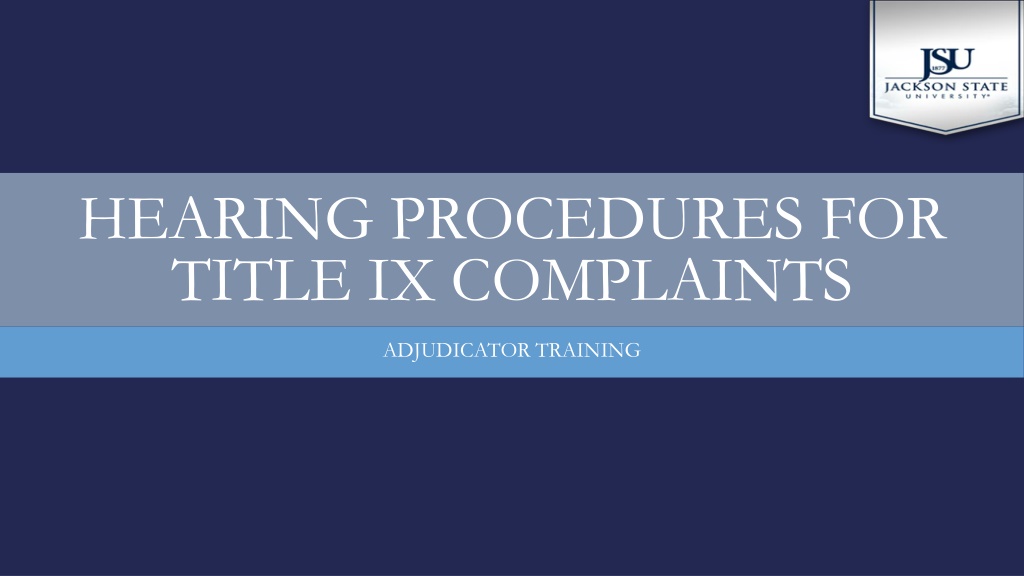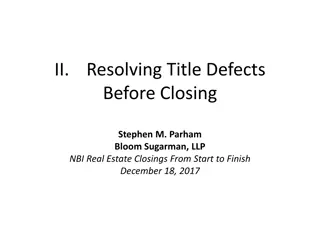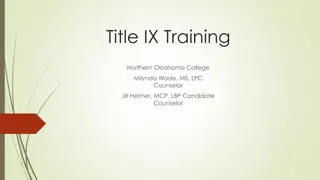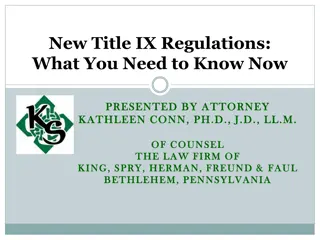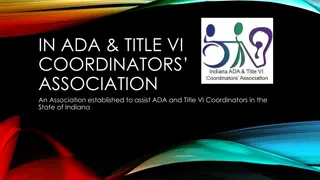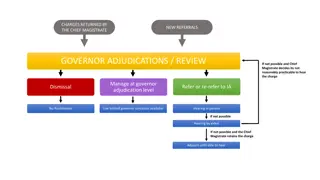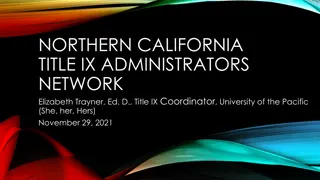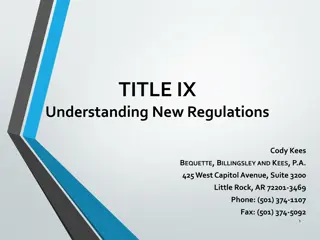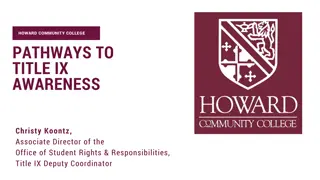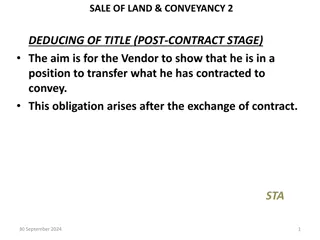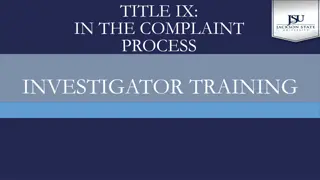Understanding Title IX Adjudicator Training
Title IX is a federal law protecting against sex discrimination and sexual harassment on university campuses. Adjudicators play a crucial role in formal hearings for complaints related to sexual misconduct. The investigation aims to gather evidence for determining respondent responsibility. The hearing's purpose is to evaluate evidence and issue a written determination on policy violations, including sex/gender discrimination and various forms of sexual harassment.
Download Presentation

Please find below an Image/Link to download the presentation.
The content on the website is provided AS IS for your information and personal use only. It may not be sold, licensed, or shared on other websites without obtaining consent from the author. Download presentation by click this link. If you encounter any issues during the download, it is possible that the publisher has removed the file from their server.
E N D
Presentation Transcript
HEARING PROCEDURES FOR TITLE IX COMPLAINTS ADJUDICATOR TRAINING
WHAT IS TITLE IX Title IX of the Education Amendments of 1972 is a federal civil rights law that prohibits discrimination on the basis of sex (and gender) on a University campus in its educational programs and activities when the University is federally funded. Title IX protects against sex discrimination (adverse treatment) and sexual harassment.
WHAT IS THE DIFFERENCE BETWEEN ADVERSE TREATMENT DISCRIMINATION AND SEXUAL HARASSMENT? Adverse treatment involves adverse action that is motivated by the individual s sex AND that directly limits or excludes the individual from participation in education program or activities. Sexual Harassment involves unwelcome conduct that is either sexual in nature or based on sex.
INTRODUCTION At the conclusion of the investigation, the parties to a Formal Complaint of sexual misconduct have a right to a formal hearing when the matter cannot be resolved through the informal process or the complaint is not dismissed. You are being asked to serve as an adjudicator on the Hearing Panel. You will be responsible for deciding responsibility.
WHAT IS THE PURPOSE OF THE TITLE IX INVESTIGATION? For the University To gather relevant inculpatory and exculpatory evidence To give the panel of adjudicators adequate opportunity to determine through a live hearing Whether or not the Respondent is responsible
WHAT IS THE PURPOSE OF THE HEARING? Hear, consider and evaluate both testimonial and non-testimonial evidence Determine credible facts Apply relevant and credible facts to the policy Issue a written determination
TYPES OF POLICY VIOLATIONS YOU WILL BE ASKED TO CONSIDER Sex/Gender Discrimination Sexual Harassment which includes: Quid Pro Quo Sexual Assault Rape Acquaintance Rape Stalking Relationship Violence (Domestic and Dating Violence)
SEX DISCRIMINATION Sex Discrimination unfairly treating an individual or group of individuals differently than others on the basis of sex or gender. Sexual misconduct is a form of sex/gender based discrimination
SEX DISCRIMINATION Sex discrimination includes: Bullying, Harassment, Exclusion from school activities, and Other forms of discrimination that can interfere with LGBTQI+ students access to a safe and inclusive school environment.
SEXUAL HARASSMENT Sexual Harassment is any unwelcome conduct that a reasonable person would find so severe, pervasive and objectively offensive that it denies a person equal education access. Conduct is considered unwelcome if the person did not request or invite it and considered the conduct to be undesirable or offensive.
GENDER-RELATED HARASSMENT Gender-related harassment is defined by any action (sexual or not) that is motivated by the gender-identity of the victim. Specific examples of gender-related harassment and violence include but are not limited to: Stalking, or Calling someone sex-specific derogatory names such as slut , fag , or queer .
WHAT IS CONSENT? Consent is an understandable exchange of affirmative actions or words which indicate an active, knowing and voluntary agreement to engage in mutually agreed upon sexual activity. Consent is not freely given when it is in response to force or threat of force or when a person is incapacitated by the (voluntary or involuntary) use of drugs or alcohol or when the person is otherwise physically helpless and the person performing the act knows or should reasonably know that the other person is incapacitated or otherwise physically helpless. An action is done without that person s consent when it is inflicted upon a person who has not freely and actively given consent.
SEXUAL ASSAULT Sexual Assault (Including Rape). Sexual assault is actual or attempted sexual contact with another person without that person s consent. Sexual assault includes, but is not limited to: Intentional touching of another person s intimate parts without that person s consent; or Other intentional sexual contact with another person without that person s consent; or Coercing, forcing, or attempting to coerce or force a person to touch another person s intimate parts without that person s consent; or Rape, which is penetration, no matter how slight, of (1) the vagina or anus of a person by any body part of another person or by an object, or (2) the mouth of a person by a sex organ of another person, without that person s consent.
DATING AND DOMESTIC VIOLENCE Dating/Domestic violence is a pattern of abusive behavior used to exert power and control over a partner. Dating/Domestic violence can be physical, sexual, emotional, or psychological actions or threats of actions that influence another person.
STALKING Stalking is a course of conduct directed at a specific person that would cause a reasonable person to fear for his/her safety or the safety of others, or to suffer emotional distress. Stalking may include repeatedly following, harassing, threatening, or intimidating another.
TITLE IX HEARING PROCESS This training is to give you an overview of the hearing process which includes: hearing procedures; rules and regulations; the roles of all of the participants; and rules of decorum. The hearing procedures shall govern the hearing process for formal resolution of Formal Complaints of alleged sexual misconduct as set forth in the Federal rules and regulations as well as in the University s Title IX policies and procedures.
WHAT IS A FORMAL COMPLAINT? Signed written document From the complainant or Title IX Coordinator Containing factual information giving rise to the alleged sexual harassment or sexual misconduct Stating the desire to initiate the grievance process
TITLE IX HEARING PARTICIPANTS Though the Title IX Hearing is not necessarily designed as a courtroom setting, there are some similarities.
PRE-HEARING CONFERENCE Meeting with all of the adjudicators Discuss the rules of decorum Discuss any questions regarding the evidence and possible objections Discuss and resolve any other matters
TITLE IX HEARING PARTICIPANTS The investigator, the Title IX Coordinator, or any other Title IX Office personnel may be present. The complainant and respondent may be present along with their advisor/representative. Witnesses for each side, if any, may be present. A panel of decision-makers (Hearing Panel) and the Panel chair will make a determination as to responsibility.
CONFLICT OF INTEREST/BIAS The Hearing Panel members will receive the names of the complainant, the respondent, and all of the witnesses, and must withdraw from the proceedings if their relationship to a party or witness, or other circumstances leads them to believe that they cannot judge the matter fairly. You will receive a Conflict of Interest Questionnaire to complete and return to the Title IX Coordinator.
HEARING FORMAT The hearing will begin with an introduction by the Hearing Officer. The introduction will include: The reason for the hearing; Introduction of all participates The role of each participate; Other preliminary matters After the introduction, and if there are no questions, the hearing will begin with opening statements.
PARTIES TO TITLE IX COMPLAINT The Complainant may be male or female. The Respondent may be male or female. The Respondent can be a student. The Respondent can be an employee/faculty member.
WHEN THE RESPONDENT IS AN EMPLOYEE/FACULTY
ADJUDICATOR DECISION The parties do not receive a copy of the Adjudicator s Panel Report. The parties receive a copy of the panels written report. The written report must contain the following: Identify the parties and the allegations of sexual harassment/discrimination * Procedural steps * Finding of facts supporting determination * Conclusion reached * Rationale * State the disciplinary sanction *
HEARING PROCESS: OPENING STATEMENTS/CLOSING ARGUMENTS Both the Complainant and the Respondent may make an opening statement and they may make closing arguments. Each side will have five minutes to make opening statements and five minutes to make closing arguments.
HEARING PROCESS: CROSS-EXAMINATION Only the party s advisor/representative may cross-examine a party or witness. Prior to the response to any cross-examination question, there will first be a determination as to whether the question is relevant. Relevance will depend on the allegations contained in the complaint. Generally, cross-examination questions will be based on a party s prior statement or the evidence. The complainant s advisor/representative will have the first opportunity to cross-examine/question the respondent and any of the respondent s witnesses. The decision-making panel will also have an opportunity to ask the respondent and any of their witnesses questions. The complainant s advisor/representative will then have an opportunity to ask follow-up questions based on the panel s questions.
HEARING PROCESS: CROSS-EXAMINATION (CONT.) Once all questions of the respondent and the respondent s witnesses have concluded, the respondent s advisor/representative will have an opportunity to cross-examine the complainant and any of the complainant s witnesses. The decision-making panel will have an opportunity to question the complainant and any of the complainant s witnesses. At advisor/representative will have an opportunity to ask follow-up questions based on the panel s questions. the conclusion of the panel s questions, the respondent s
HEARING PROCESS: CROSS-EXAMINATION (CONT.) A party or witness may decide not to submit to cross- examination at the hearing or decide not to participate in the live hearing at all. You credibility based on a party s decision not to participate in the live hearing. cannot make any determinations regarding
HEARING PROCESS: STATEMENTS MADE BY A PARTY OR WITNESS For the purposes of this process, statements are factual assertions made by a party or witness. Statements might include factual assertions made during an interview or conversation, written by the individual making the assertion (formal complaint) and/or memorialized in the writing of another (investigative report, police report, etc.).
HEARING PROCESS: CREDIBILITY Credibility believability of a party, witness, report, or any of the evidence. Determination of the weight given to the testimony or to the evidence. Is there evidence to support the testimony? Is there physical evidence or is all of the evidence testimonial? What does your life experience tell you? What does your common sense tell you?
HEARING PROCESS: RELEVANCE A party or witness is only to respond to relevant questions. Relevance will depend on what was alleged in the complaint. Relevance will be considered on a question by question basis and will be determined prior to the party responding to the question.
IRRELEVANT QUESTIONS Questions and evidence about the complainant s sexual predisposition or prior sexual behavior are not relevant, unless such questions and evidence about the complainant s prior sexual behavior are offered to prove: (1) that someone other than the respondent committed the conduct alleged; or (2) the questions and evidence concern specific incidents of the complainant s prior sexual behavior with respect to the respondent and are offered to prove consent. Questions that are duplicative or repetitive are also irrelevant.
IRRELEVANT QUESTIONS: QUESTIONS NOT PERMITTED Questions that seek information about any party s medical, psychological, and similar records are not permitted unless the party has given written consent. Questions regarding statements of personal opinion or statements as to any party s general reputation for any character trait are not relevant.
HEARING PROCESS: STANDARD OF REVIEW In order to determine whether the respondent has violated the Misconduct Policy, the standard of proof required is by a preponderance of the evidence, i.e. the evidence demonstrates that it is more likely than not that the conduct occurred. University s Sexual
PRESENCE AND PARTICIPATION AT THE HEARING A complainant or respondent is not required to appear at the hearing in order for the hearing to proceed. If a party does not appear for the hearing, their advisor/representative may still appear for the purpose of asking cross-examination questions of the other party and witnesses. If the complainant or respondent fails to appear for a Zoom hearing due to circumstances beyond their control the hearing shall be postponed and rescheduled. If despite being notified of the hearing and in the absence of clear evidence of an emergency situation, either the complainant or respondent fails to appear, the Hearing Officer will determine if the hearing will proceed with the available testimony and evidence.
RULES OF DECORUM FOR TITLE IX HEARINGS All Participates will adhere to the following: 1. The parties and their advisors will remain seated at all times during the hearing unless during a break. 2. The parties are prohibited from yelling, using verbal abuse, or any disruptive behavior of any kind. No one is to interrupt or talk over anyone else. 3. Any participate in the hearing who is not currently involved in questioning should refrain from disrupting the hearing in any way. 4. During questioning, the answer is the answer. 5. Other than for cross-examination, advisors/representatives are not to speak. Other than to respond to questions posed to them, complainants, respondents, and witnesses are not to speak.
RULES OF DECORUM FOR TITLE IX HEARINGS (CONT.) As decision-makers, you are allowed to ask questions. However, you should not: -repeat a question that has already been asked; -characterize the testimony given; -openly express an opinion about the testimony; -editorialize or otherwise state any response to the answer given by the party or witness except to ask a follow-up question.
WRITTEN DETERMINATION After the hearing, the adjudicators will retire to deliberate and consider all credible, admissible testimony and evidence Resolve disputed issues of fact under a preponderance of evidence standard Using the facts as found, apply the University s definition to those facts to determine whether sexual harassment or sex discrimination occurred
HEARING RECORDS The hearing is closed to the public. In addition to witnesses, the decision-making panel, the Hearing Officer, and the Title IX Coordinator, the parties may have at most two advisors present at the hearing. The University shall keep a transcript or audio recording of the hearing. Any other recording is prohibited. The parties may inspect and review the transcript or audio recording after it is completed.
POST-HEARING PROCESS At the conclusion of the hearing, the panel will deliberate to make a determination as to responsibility. If Misconduct/Title IX Policy, based on the panel s recommendation, the Title IX Coordinator will recommend a sanction designed to eliminate the misconduct, prevent its recurrence, and remedy its effects. the respondent is found responsible for violating the Sexual The parties will be notified in writing of the panel s decision.
CONCLUSION Please pay attention to the totality of the circumstances and not just any specific moment. Please keep an open mind and listen to all of the credible testimony and consider all of the evidence in order to make a fair and impartial decision regarding responsibility. Questions/Answers
